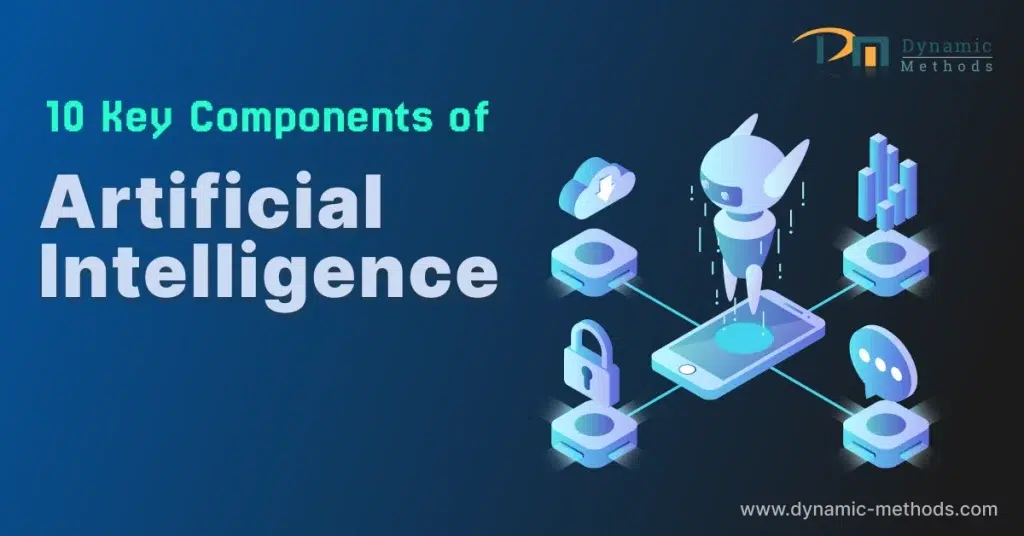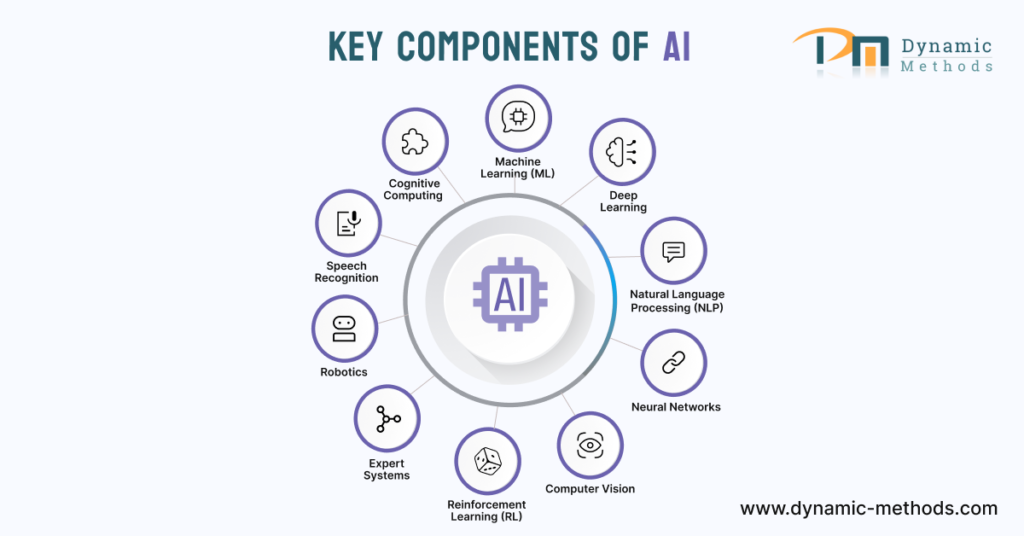
Artificial Intelligence (AI) has swiftly transitioned from being a futuristic concept to becoming a vital element across various industries. From autonomous vehicles to customized healthcare solutions, AI is drastically reshaping how we live, work, and interact with technology. But what exactly does AI entail, and how does it function?
This comprehensive article will demystify the key components of artificial intelligence, explore its intricate workings, and examine its diverse applications across sectors. By the end, you’ll gain a deep understanding of AI’s inner mechanics and how it’s revolutionizing the modern world.

1. Machine Learning (ML)
Machine Learning is pivotal to AI, empowering systems to learn from data and progressively enhance their performance without direct programming. Machine Learning is categorized into three types of learning:
- Supervised Learning: This method uses labeled datasets to train algorithms, enabling the system to associate inputs with correct outputs. For instance, a model might be trained to recognize cats by being shown numerous labeled images. This approach is fundamental in applications like image recognition and predictive analytics.
- Unsupervised Learning: In contrast, this technique works with unlabeled data, searching for hidden patterns without predefined outcomes. It's commonly used in customer segmentation and market analysis.
- Reinforcement Learning: This model draws inspiration from behavioral psychology, where agents learn by interacting with their environment, receiving rewards or penalties, and refining their decision-making over time.
2. Deep Learning
Deep Learning, a subset of machine learning, leverages neural networks with many layers to analyze complex data patterns. It has brought transformative success in fields previously challenging for conventional ML.
- Convolutional Neural Networks (CNNs): Designed to process visual data like images, CNNs are used in tasks ranging from image classification to facial recognition.
- Recurrent Neural Networks (RNNs): These networks excel in sequential data tasks, such as language translation and speech recognition, thanks to their ability to retain memory of previous inputs.
3. Natural Language Processing (NLP)
Natural Language Processing (NLP) is the aspect of AI that equips machines to comprehend, interpret, and generate human language. It forms the backbone of many conversational AI systems.
- Text Processing: Allows for tasks like summarization and sentiment analysis, making it essential for chatbots and search engines.
- Speech Recognition: Converts spoken language into text, a critical component of virtual assistants like Siri and Alexa.
- Sentiment Analysis: Extracts emotional tone from text, helping companies assess customer feedback and make data-driven decisions.
4. Computer Vision
Computer vision is the field of artificial intelligence to perceive and interpret the visual world.
- Image Classification: Assigns labels to images based on their content, used extensively in fields such as medical imaging.
- Object Detection: Not only identifies objects within an image but also pinpoints their locations, which is essential for autonomous vehicles and security systems.
- Facial Recognition: A widespread technology used for everything from unlocking phones to security, though it raises concerns over privacy and surveillance.
5. Robotics
Robotics marries is a component of Artificial Intelligence with mechanical systems, allowing machines to perform physical tasks.
- Autonomous Vehicles: Self-driving cars use AI to make real-time decisions, employing a mix of computer vision and machine learning to navigate roads.
- Industrial Robots: Common in manufacturing, these robots carry out tasks like assembly and painting with precision, often adapting to new conditions using AI algorithms.
6. AI Ethics and Bias
As AI continues to permeate various aspects of life, ethical concerns become paramount.
- Fairness: AI systems can unintentionally perpetuate biases present in their training data. Ensuring equitable outcomes, particularly in hiring or law enforcement, is critical.
- Transparency: It's vital to make AI decisions understandable, especially in high-stakes fields like healthcare.
- Accountability: As AI becomes more autonomous, clear guidelines must be established to determine responsibility for AI-driven decisions.
7. AI in Healthcare
AI is pushing boundaries in healthcare, enabling earlier diagnoses and personalized treatments.
- Medical Imaging: AI algorithms analyze X-rays and MRIs to detect conditions like cancer earlier than traditional methods.
- Predictive Analytics: AI identifies patients at higher risk for health issues, allowing for proactive treatment strategies.
- Personalized Medicine: AI analyzes genetic data to customize treatments based on individual patient profiles, potentially revolutionizing treatment plans.
8. AI in Finance
AI’s capabilities are revolutionizing the finance sector, driving efficiencies and reducing risk.
- Algorithmic Trading: AI algorithms analyze market trends to execute trades with high speed and precision.
- Fraud Detection: AI helps identify fraudulent activities by analyzing financial transaction patterns in real time.
- Credit Scoring: AI offers more nuanced assessments of credit risk, factoring in diverse data points to provide better lending decisions.
9. Explainable AI (XAI)
With AI systems growing increasingly complex, there’s a demand for explainability.
- Interpretable Models: These models shed light on how decisions are made, building trust with users by making AI more transparent.
- Model Transparency: Understanding how AI systems weigh factors in decision-making can help industries like healthcare make more informed choices.
10. AI in Gaming
The gaming industry is leveraging AI to create more dynamic and immersive experiences.
- Game AI: AI controls non-player characters (NPCs) to provide players with realistic challenges.
- Procedural Content Generation: AI helps generate new game levels and quests, vastly expanding game worlds without added developer effort.
- Reinforcement Learning in Games: This technique enables AI to learn and improve performance over time, challenging even the most skilled human players in strategy games.
Conclusion
Artificial Intelligence is a multifaceted domain encompassing a variety of technologies and applications. From machine learning and deep learning to ethics and healthcare, each facet plays a significant role in shaping AI’s future. As we continue to explore and enhance these technologies, it’s essential to address both the opportunities and challenges they present. By gaining a deeper understanding of AI’s workings, we can harness its power for the betterment of society.










Usually I do not read article on blogs however I would like to say that this writeup very compelled me to take a look at and do it Your writing style has been amazed me Thank you very nice article
Thank you! I’m thrilled the article caught your interest. I appreciate your kind words!
Hi there, I found your blog by the use of Google at the same time as looking for a comparable subject, your website got here up, it seems great. I have bookmarked it in my google bookmarks.
Thank you for bookmarking! I’m glad you found the blog helpful and appreciate your support.
Simply desire to say your article is as surprising The clearness in your post is simply excellent and i could assume you are an expert on this subject Fine with your permission let me to grab your feed to keep up to date with forthcoming post Thanks a million and please carry on the gratifying work
Thank you so much for your kind words! I’m glad you found the post clear and helpful. Feel free to subscribe—your support means a lot! 😊